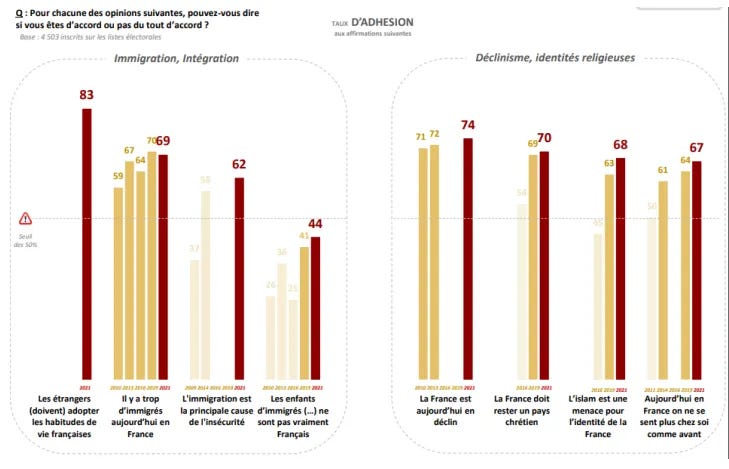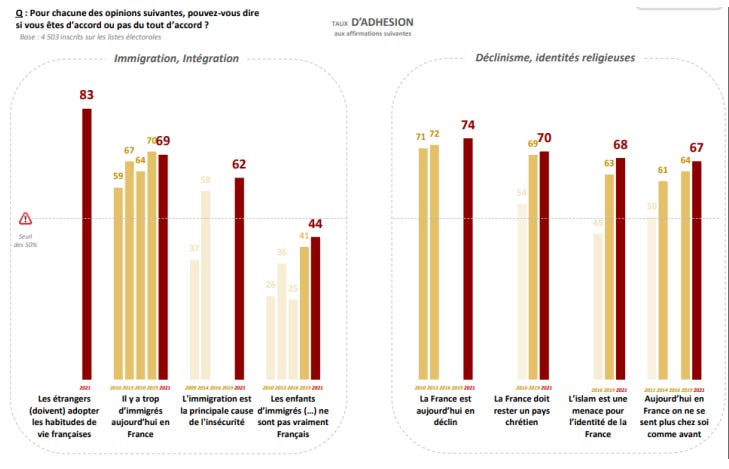France is one of the most dynamic and culturally significant White, Western, nations that exist, yet the French populace is under constant demographic, cultural, and political attack by the same neoliberal elite that plagues much of the rest of Western civilization.
Violent migrant crime, ranging from the infamous Bataclan attacks of 2015 to the June 2023 stabbing committed by a Syrian migrant with asylum in Sweden resulted in six people being attacked, including four preschool-age children. When the neoliberal elite of the postwar order opened the frontiers of Europe it was not with a pro-White vision in mind. What the elite have created is a Europe whose frontiers are open to the entire world, an entire world that is relentlessly pouring into the birthplace of Western civilization and assaulting our women, children, and elderly on a daily basis.
And, perhaps uniquely among White peoples, the French are keenly aware of the situation and represent the population that is likely the most politically engaged by the Great Replacement.
The French political class has a clear and popular mandate not only to do something about migrant crime (which makes 63% of the French feel unsafe in their own country) but also to begin a project to rectify the demographic damage that has been visited upon the French nation.
A staggering 69% of the French believe that there are too many migrants in France, and 61% of the French public believe that the Great Replacement is not theory, but fact. The youth of France are particularly engaged by the negative consequences of demographic change, with Marine Le Pen winning the majority share of voters under 40 in the previous French presidential election.
Conversation about the Great Replacement is common and even mainstream in France, as White Papers has outlined in previous pieces:
With widespread belief in the reality of the Great Replacement, discussion about demographics being common in political, social, and media circles, and the recent horrific attack likely to bring the discussion even more into the popular light, it is important that the French people know there are options to resolve this serious crisis.
White Papers is not so delusional as to believe that Emmanuel Macron or his non-French Prime Minister, Gabriel Attal, will be the ones to reverse the demographic destruction of France. Rather we believe that if the French people are aware that it is truly a policy option, than they will take the steps toward the revolution in domestic politics necessary to rescue their children and their nation.
The Current Situation:
France’s national statistics agency, the Institut national de la Statistique et des études économiques (INSEE), is not permitted to collect data on race, ethnicity, religion, or other protected characteristics, and so many of the figures we are going to give in the analysis of this section are broad estimates subject to variation.
Still, Insee itself estimates that in 2019-2020 9% of the population of France came from abroad. This represents roughly 7 million people out of the nation with a population of some 67.2 million. Of these 7 million people about 5.2 million of them do not possess French nationality, and 67% are not from other European states.
This means that there are 3.5 million largely non-White immigrants in France who do not hold French citizenship. There are a further 800,000 individuals who are illegal immigrants in the country, bringing the total of non-citizen non-Whites to roughly 4.3 million people.
Many may be shocked that France, a country many people believe to be entirely overrun by Arabs and Africans, does not have a larger foreign-born population. For comparison, Germany sports a foreign-born population of some 13.8 million people, double the number in France and representing 18% of the overall population of Germany.
The low foreign-born share of the French population is a result of rather modest immigration laws which did not open the country up to the degree that the 1965 Immigration Act in the US or the Empire Windrush period in Britain opened those nations to mass immigration. Laws such as the Pasqua Law of 1993 have largely prevented permanent settlement in France, and in the 1990s and early 2000s France was admitting roughly 100,000 non-European immigrants a year. From 2006 onward this number has slowly climbed into the higher 100,000 range, generally around 150,000-180,000.
With these immigration figures numbers in mind, it comes as no surprise that 12% of the French population are second-generation immigrants. Another 10% are third-generation immigrants born to the children of the original immigrant generation to the country. The second generation of immigrants represents roughly 8 million individuals, while the third generation is composed of roughly 4.8 million people, according to INSEE.
Of these 12.8 million second-generation immigrants and beyond roughly 4.78 million are known to be non-White/non-European, according to the Institut national d'études démographiques (INED).
Policy Options:
The first step is the cancellation of visas and the enforcement of deportation orders. With as many as 4.3 million non-White non-citizens present in France this process alone would radically reduce the population of non-Europeans in the country and ensure that further naturalization of non-Whites does not take place.
This process would also take along large amounts of French-born second and third-generation immigrants who are under the age of 18 and cannot be separated from their parents. Currently, about 55-60% of Moroccan, Tunisian, Algerian, Turkish, and other African immigrant descendants are under the age of 18 years old, meaning that as many as 3 million immigrant-descended children could be expected to leave France with their parents.
The next step would be the revocation of the French citizenship of the millions of naturalized immigrants in the country. France has an extremely broad set of regulations and laws which enable the Council of State to denaturalize those who:
Undermine the fundamental interest of France
Lie or commit fraud in the acquisition of their nationality
Interfere with the public administration of France and the individual freedoms of Frenchmen
Served in a foreign government’s public or armed services
These options give a nationalist French administration, should one arise in the coming years, ample room to begin denaturalizing those non-Europeans who pose a threat to the state and to begin deporting them back to their ancestral homelands.
These former citizens too would have to take their family members and underage children with them when they departed France after being denaturalized, once again radically reducing the non-White/non-European population of the country.
Conclusion:
Those who are left behind, the few million second-generation non-Whites born in France and who cannot legitimately be denaturalized under current law, would face the choice of remaining in a France that is now self-confident and assertively nationalist or departing on a voluntary basis with their family members.
A national conversation could be had about the creation of a paid and voluntary repatriation program to help these departures, but this process would take the form of legislative changes instead of the above-outlined executive actions.
Of all White countries France is the best positioned to begin a Great Repatriation with broad public support, and to reverse decades of liberalism’s effect on state immigration policy.
White Papers is attempting to double our donor base this summer! Please Support our mission to take on more writers and policy experts:
Zelle: whitepapersinstitute@protonmail.com
Buy us a coffee: https://www.buymeacoffee.com/wppi
Linktree: https://linktr.ee/wppi
Snail Mail: White Papers Policy, PO Box 192, Hancock, MD 21750






